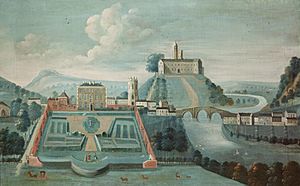Ann Fenwick facts for kids
Quick facts for kids
Ann Fenwick
|
|
|---|---|
| Born | 1724 |
| Died | 28 April 1777 Hornby Hall And Barns Adjoining
|
| Nationality | Kingdom of Great Britain |
| Known for | Court case |
Ann Fenwick (born 1724 – died 28 April 1777) was a British Roman Catholic woman who inherited a lot of money. She had to fight for her rights in court, even going to the House of Lords. This happened when her brother-in-law tried to take her wealth. He thought he could because she was a woman and not a Protestant. Ann became a symbol of strength for Catholics in Lancashire.
Ann's Early Life

Ann Fenwick grew up in a rich family. Her parents were Thomas and Ann (Dowbiggin) Bennison. In 1735, they moved into a big house called Hornby Hall. A famous painter named Arthur Devis even painted a picture of them arriving at their new home.
Soon after, Ann's father, Thomas, passed away. In his will, he left Hornby Hall and all his money to his daughter, Ann. Her mother was in charge of managing everything. In 1737, Ann's wealth grew even more when her uncle died. He left her a share in a ship called the True Love.
Ann's mother was Catholic and very educated. Her father had been a skilled lawyer. Ann's mother looked after the family property until Ann turned twenty-one.
Fighting for Her Fortune
In 1752, Ann married a Protestant man named John Fenwick. For a short time, her fortune was put in her husband's name. This was done to help him with his business.
However, in 1757, her husband died while hunting. The property was still in his name. At the same time, Ann was very sick with cancer at Hornby Hall. The property was supposed to go to her husband's brother, Thomas Wilson. He was a lawyer and had taken his brother's last name, Fenwick.
The ownership of Hornby Hall was unclear. In 1759, Ann accepted a deal from her brother-in-law. He offered her the right to live in the hall for the rest of her life. He also promised her £3,000 and £400 every year. Her brother-in-law's career went well. In 1768, he became a Member of Parliament (MP) for Westmorland.
But the yearly payments of £400 often didn't arrive, or they were very late. By 1770, Ann Fenwick was in serious financial trouble. She had to go to court to make her brother-in-law keep his promise. Her case was difficult because Thomas Fenwick was an MP. Also, Ann was Catholic, and the law at the time made it harder for non-Protestants to win court cases.
Despite these challenges, Ann won her case! The court said she should receive £18,000. Her brother-in-law disagreed with the decision. So, Ann had to take her case to the highest court, the House of Lords, in 1772. Ann's brother-in-law lost the case there too. He also lost the support that helped him become an MP. He was not chosen again in the next election.
Ann's Faith
Ann's mother was Catholic, and her faith was very important to Ann. She enjoyed practicing her religion. After her mother died in 1762, Ann's health got worse. She invited a priest named Thomas Butler to Hornby. He had studied in Douai, France, and he held Catholic Mass services there. Butler also held Mass in Claughton. Even though she married a Protestant, Ann stayed connected to other Catholics. She even received books from important Catholic figures like Richard Challoner.
Ann's Death
Ann Fenwick passed away at Hornby Hall on 28 April 1777. She left very detailed instructions in her will. She was buried with her parents at St Wilfrid's Church, Melling. A historian named John Lingard later became connected with Hornby in 1811.
 | Charles R. Drew |
 | Benjamin Banneker |
 | Jane C. Wright |
 | Roger Arliner Young |

